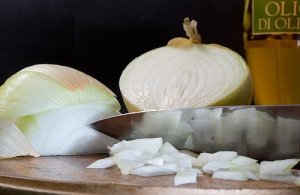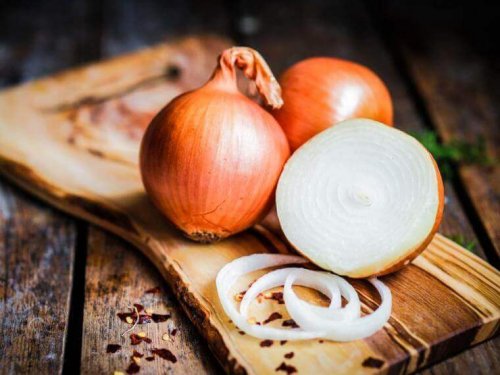The Many Benefits of Eating Onions

Onions are one of the most indispensable foods in your kitchen. After all, you can cook and eat them so many ways in so many different dishes. Plus, the nutritional properties and benefits of onions make them one of the most highly recommended foods.
In this article, we’ll take a look at some of these amazing benefits.

The Nutrients in Onions
The main component of onions is water, which makes up approximately 90% of the onion.
Because of this, it might surprise you that the remaining 10% is packed full of nutrients, and those nutrients boast many health benefits.
Here are just a few of them:
- Essential oils are responsible for the majority of onions’ beneficial properties. They’re also the reason for the crying that happens when you peel or cut onions.
- B group vitamins are necessary for the correct functioning of your nervous system and your immune system.
- Vitamins E and C, with powerful antioxidant action.
- Various minerals and trace elements, such as potassium, magnesium, phosphorus, calcium, sodium, and sulphur, among others.
- Essential amino acids.
- Fiber.
Read:
The Healthy Properties of Onions
Diuretic properties
One of the most well-known properties of onions is their diuretic ability.
This is why onions are highly recommended to patients who suffer from kidney issues, gout, kidney stones, edema, or hypertension.
This is mainly because of their diuretic effect. However, it’s also due to their high content of water and fiber and low amounts of fat and sugar.
Read:
An Amazing Detox Diet to Cleanse Your Kidneys
They’re great at treating and preventing diseases
Onions also work as an expectorant and help to kill bacteria and fungus.
Onions are wonderfully useful for people who suffer from colds, the flu, bronchitis, pharyngitis, and other respiratory illnesses.
In recent years, onions have also shown their beneficial effect in the treatment of asthma and allergies.
Onions are also a powerful heart protector, thanks to their anti-thrombosis, hypo-lipidemic (this is the ability to lower levels of cholesterol and triglycerides in your body), and hypo-tensive properties.
They help your digestion
The most well-known of the purifying abilities of onions is most likely their ability to remove toxins that are produced in the stomach during digestion. This a process that also serves to stimulate your liver, pancreas, and vesicle in order to allow them to secrete the necessary substances.
However, these properties only work if you eat raw onions.
Cautions
Although onions are great, you should avoid eating them too much if you:
- Have a weak stomach,
- Suffer from acid reflux,
- Have a tendency towards flatulence or excessive gas.
Take Advantage of the Benefits of Onions
The benefits of eating onions are innumerable, and we haven’t gone over all of them!
Because onions are so beneficial, you should try to eat them daily in any form, but preferably raw. This way, you’ll be able to conserve and enjoy all of their beneficial properties.
All cited sources were thoroughly reviewed by our team to ensure their quality, reliability, currency, and validity. The bibliography of this article was considered reliable and of academic or scientific accuracy.
- Davani-Davari D, Negahdaripour M, et al. Prebiotic: definition, types, sources, mechanisms and clinical applications. Foods. Marzo 2019. 8 (3): 92.
- Eldin I. M, Ahmed E. M, et al. Preliminary study of the clinical hypoglycemic effects of allium cepa (red onion) in type 1 and type 2 diabetic patients. Environmental Health Insights. 2010. 4: 71-77.
- Fundación Española de Nutrición (FEN). Cebolla.
- Gupta N. Onion (Allium cepa) – Ethnomedicinal and therapuetic properties. Biology. 2014.
- Hewawasam S, Iacovou M, et al. Dietary practices and FODMAPs in South Asia : applicability of the low FODMAP diet to patients with irritable bowel syndrome. Journal of Gastroenterology and Hepatology. Febrero 2018. 33 (2): 365-374.
- Kabrah A, Faidah H. S, et al. Antibacterial effect of onion Mr. 2016.
- Kianian F, Marefati N, et al. Pharmacological properties of Allium cepa, preclinical and clinical evidences; a review. Iranian Journal of Pharmaceutical Research. Primavera 2021. 20 (2): 107-134.
- Li Q, Whang W, et al. Health benefits of the flavonoids from onion: constituents and their pronounced antioxidant and anti-neuroinflammatory capacities. Journal of Agricultural and Food Chemistry. Enero 2020. 68 (3): 799-807.
- Mayo Clinic. Add antioxidants to your diet. Marzo 2022.
- Salehi B, Machin L, et al. Therapeutic potential of quercetin: new insights and perspectives for human health. ACS Omega. Mayo 2020. 50 (20): 11849-11872.
- Terry P, Lagergren J, et al. Reflux-inducing dietary factors and risk of adenocarcinoma os the esophagus and gastric cardia. Nutrition and Cancer. 2000. 38 (2): 186-91.
- Turati F, Pelucchi C, et al. Allium vegetable intake and gastric cancer: a case-control study and meta-analysis. Molecular Nutrition & Food Research. Enero 2015. 59 (1): 171-9.
- Turati F, Guercio V, et al. Colorectal cancer and adenomatous polyps in relation to allium vegetables intake: a meta-analysis of observational studies. Molecular Nutrition & Food Research. Septiembre 2014. 58 (9): 1907-14.
This text is provided for informational purposes only and does not replace consultation with a professional. If in doubt, consult your specialist.









